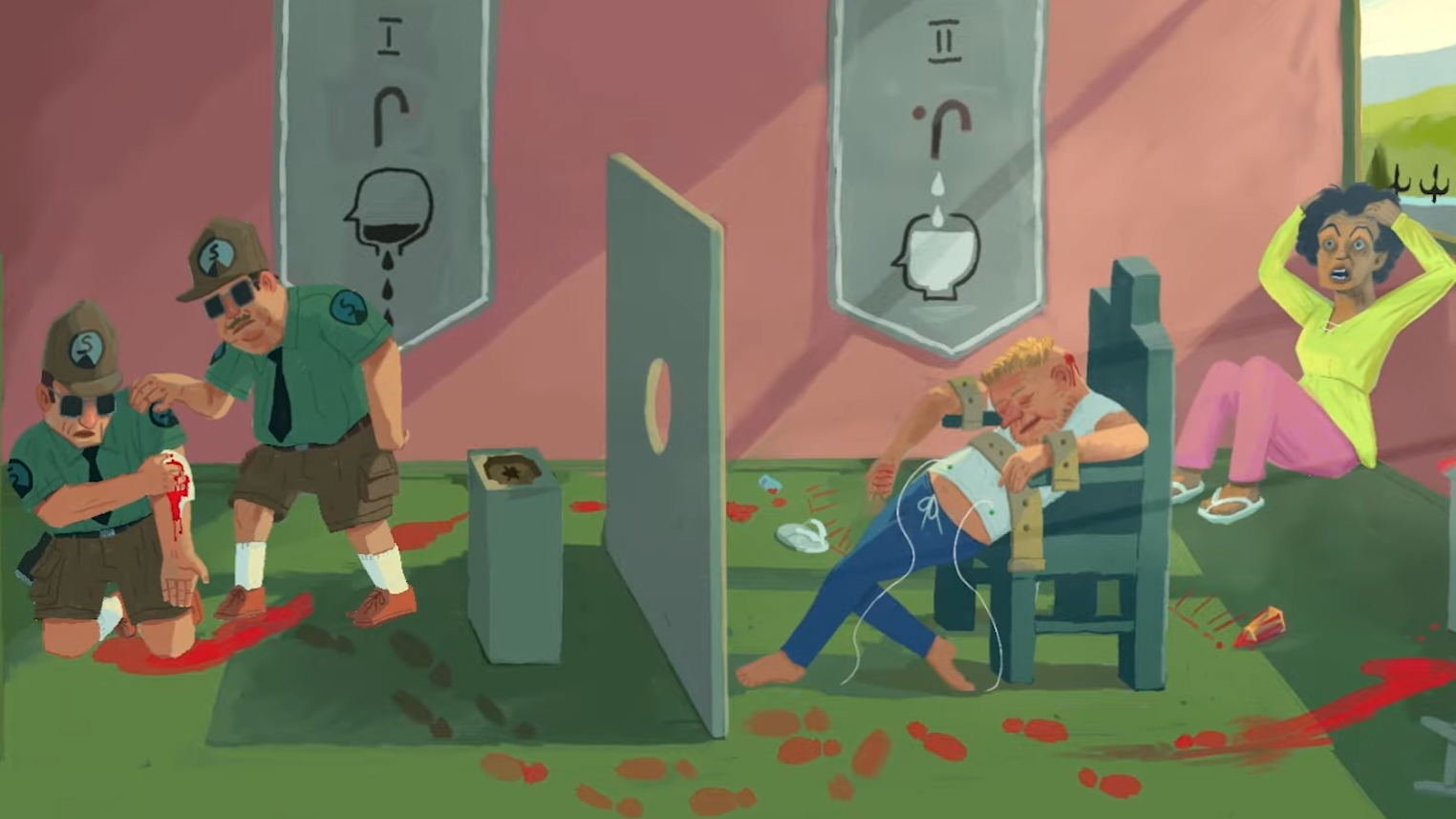
Imagine standing on the sidewalk in front of a block of apartments, but instead of seeing only closed doors and drawn curtains you can peer inside each room as if you had X-ray vision. In one apartment, a couple sits at a dinner table, but their body language suggests some awkwardness. Maybe it's a first date? The wall of a second apartment is covered with notes, diagrams, and red string connecting them: the occupant is investigating something, but what?
Finally you spot what you're here for: a dead body. A man lies on the floor of his apartment with a gun in his hand and a hole in his head, while in the laundry room someone else prepares to wash red stains off their shirt. That's a bit suspicious, isn't it?
In mystery adventure The Rise of the Golden Idol, it's your job at grisly crime scenes like this to sort out not just what happened, but how it happened, and especially why it happened. Just as in its prequel, The Case of the Golden Idol, the answers only come after exhaustively examining the scene, identifying the participants, and building a narrative of the events. Once again the cases are incredibly clever and solving them is almost always deeply satisfying, and each brings you a step closer to unraveling a central mystery that sprawls through the entire game.
Gold standard
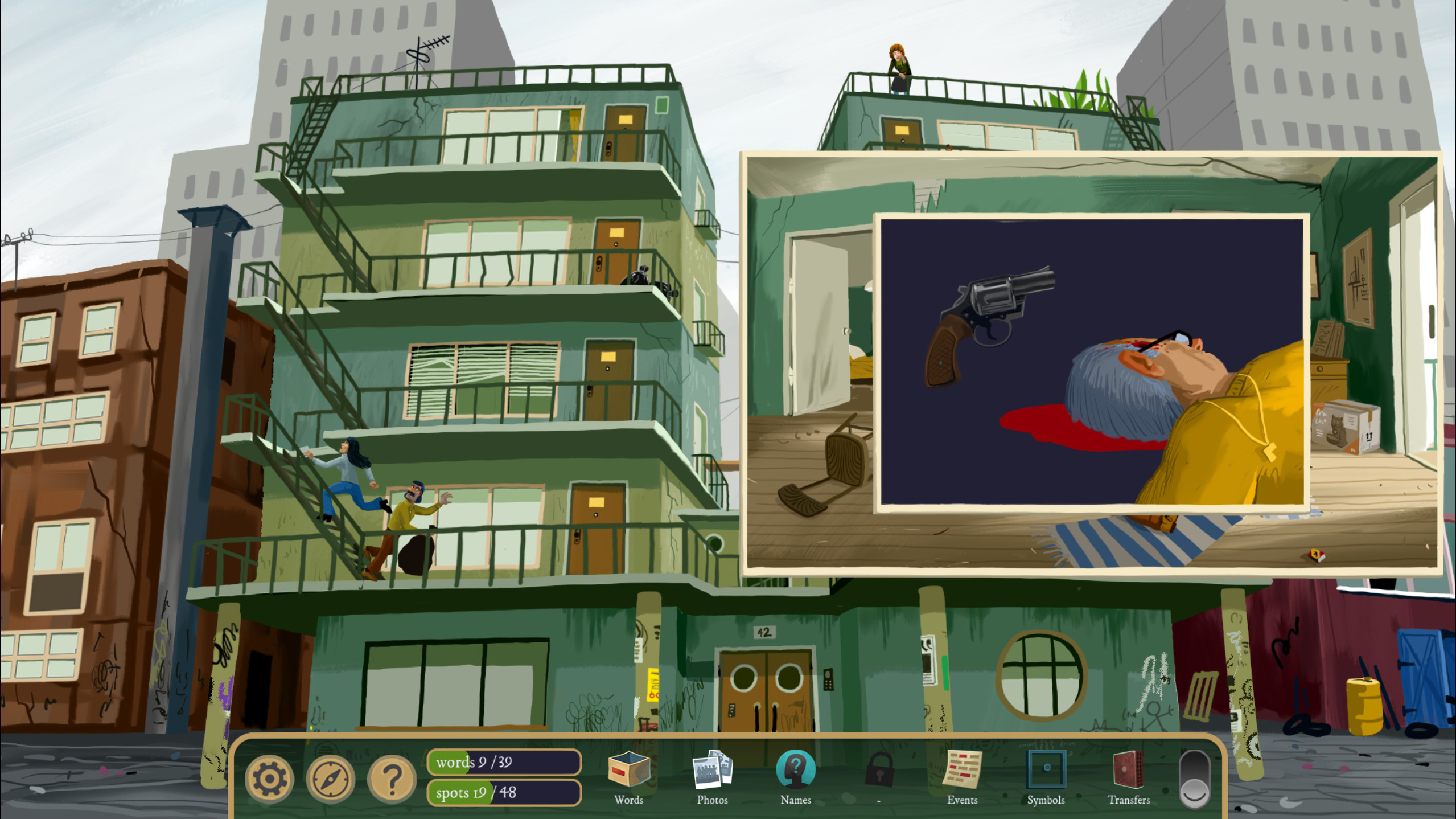
200 years ago a strange and powerful artifact was found and immediately inspired people to start killing each other in order to possess it. That was the story in 2022's excellent The Case of the Golden Idol, one of the most inventive and challenging detective games I've ever played. In the sequel, which doesn't quite reach the original's heights but is excellent as well, developer Color Gray Games drops us into the gritty 1970s, where the long lost Idol has once again resurfaced. As various parties try to unravel its powers and gain control of the relic, wouldn't you know it? The bodies are stacking up again.
As in the first Golden Idol game, the scenes you examine in The Rise of the Golden Idol are frozen tableaus with just a bit of animation to suggest you're watching one or two seconds of time on a loop: a scientist lurching across a laboratory in flames, or a two people jabbing accusatory fingers at each other during an argument. Clicking on points of interest in a scene reveals more details: a matchbook in someone's pocket, a duty roster on a clipboard, a set of keys, a lipstick, a gun.
Each time you find something, you collect a few words: someone's first or last name, nouns like "circuit box" or "bracelet," verbs like "sabotaged" or "experimented." Each word you collect can be dragged and dropped into blanks on your investigation sheets. For example: Chris Livingston used a bracelet to sabotage the circuit box. To solve a scene, you'll need to correctly label each person in the scene with their full name, and use your word collection to assemble a narrative of events: murderous Mad Libs.
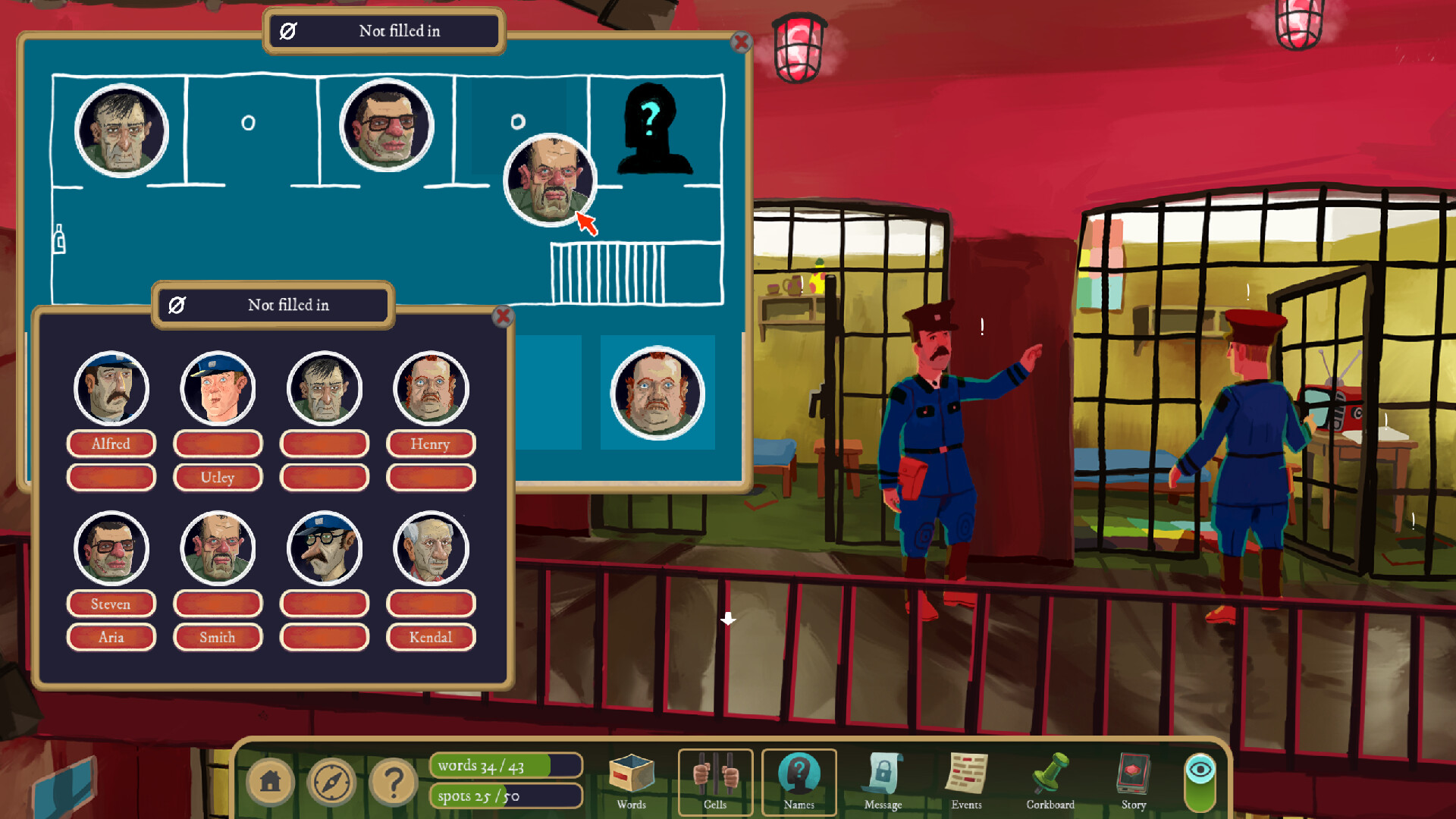
Collecting words is done by clicking on things but true understanding only comes from close examination of everything in the scene: poring over notes on cork boards and letters in pockets, gathering clues in desk drawers and wastebaskets, scrutinizing the tiniest details like the torn cuff of a sleeve or a splotch of paint. Even fingerprints need to be examined at one point, every detective's dream come true.
Anything can be a clue, even if a word isn't associated with it. One mystery depicting the aftermath of a violent encounter in a house confounded me for a long while because even though I'd put nearly all the individual pieces together, I couldn't figure out what actually kicked things off, the spark that ignited the conflict. Finally, I spotted it, a tiny detail on one character that I'd missed the first 10 times I'd looked at them. I won't even spoil it because when it clicked into place suddenly everything else on the screen made perfect sense. The Rise of the Golden Idol is full of "A-ha!" moments like this, and I'm pretty sure I actually said it out loud when I finally solved this particular case.
It's all connected to the Idol, even if it takes a while to see how.
The full story of The Rise of the Golden Idol is a sprawling one, at times bafflingly so. In the first game the crime was pretty quickly apparent in each case, but here there often isn't something as obvious as a dead body, and sometimes there doesn't even appear to be an actual crime. On several occasions I had no idea why I was investigating certain scenes: why am I in an animal sanctuary trying to figure out why a park ranger got attacked by a bird, and why do I care about reconstructing the events that led to an argument at a talent show? But as I dutifully investigate oddball occurrences like a fire at a drive-in theater or a medical emergency on the set of a soda commercial, the connection inevitably becomes clear: it's all connected to the Idol, even if it takes a while to see how.
C.S. Idol
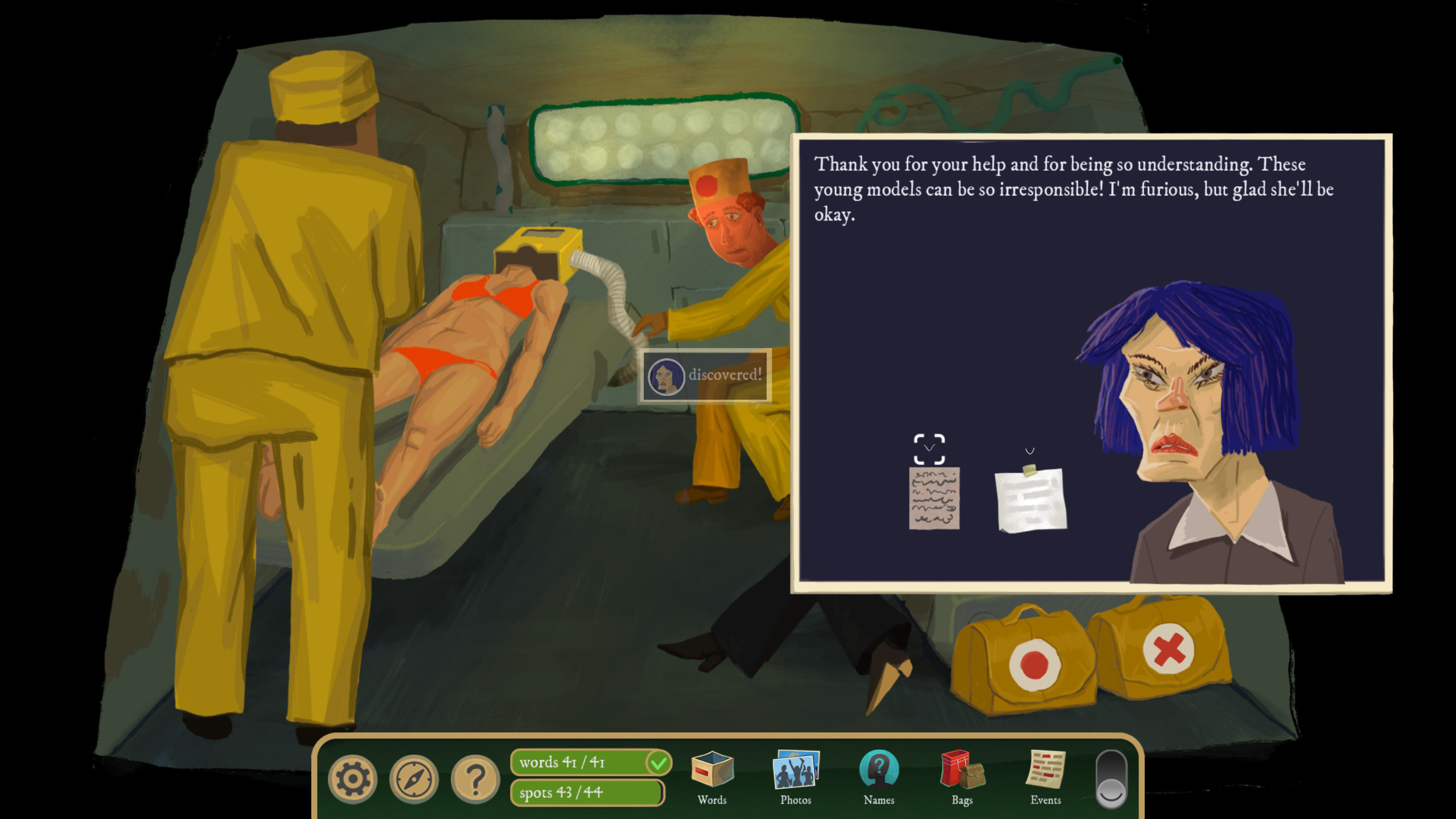
I loved the art style of the original game, its deceptively crude pixel art that was still easily readable, its characters nearly grotesque but also somehow charming. In Rise of the Golden Idol the art is much more smooth, more like paintings than drawings, but it still retains the unusual, offbeat style of the original.
Color Gray Games has also thrown some new tricks into your detective kit to help you solve a few cases. One scene in particular I really loved, where a recording of a TV show can be watched, rewound, paused, and stepped through a frame at a time to closely examine what's happening and what it means to the case at hand. Another scene can be viewed in two different states: a room where the private auction of an artifact is taking place, and the same room an hour later when something has gone terribly wrong. Only by clicking between those two different times and gathering information from both can you determine what happened, and why.
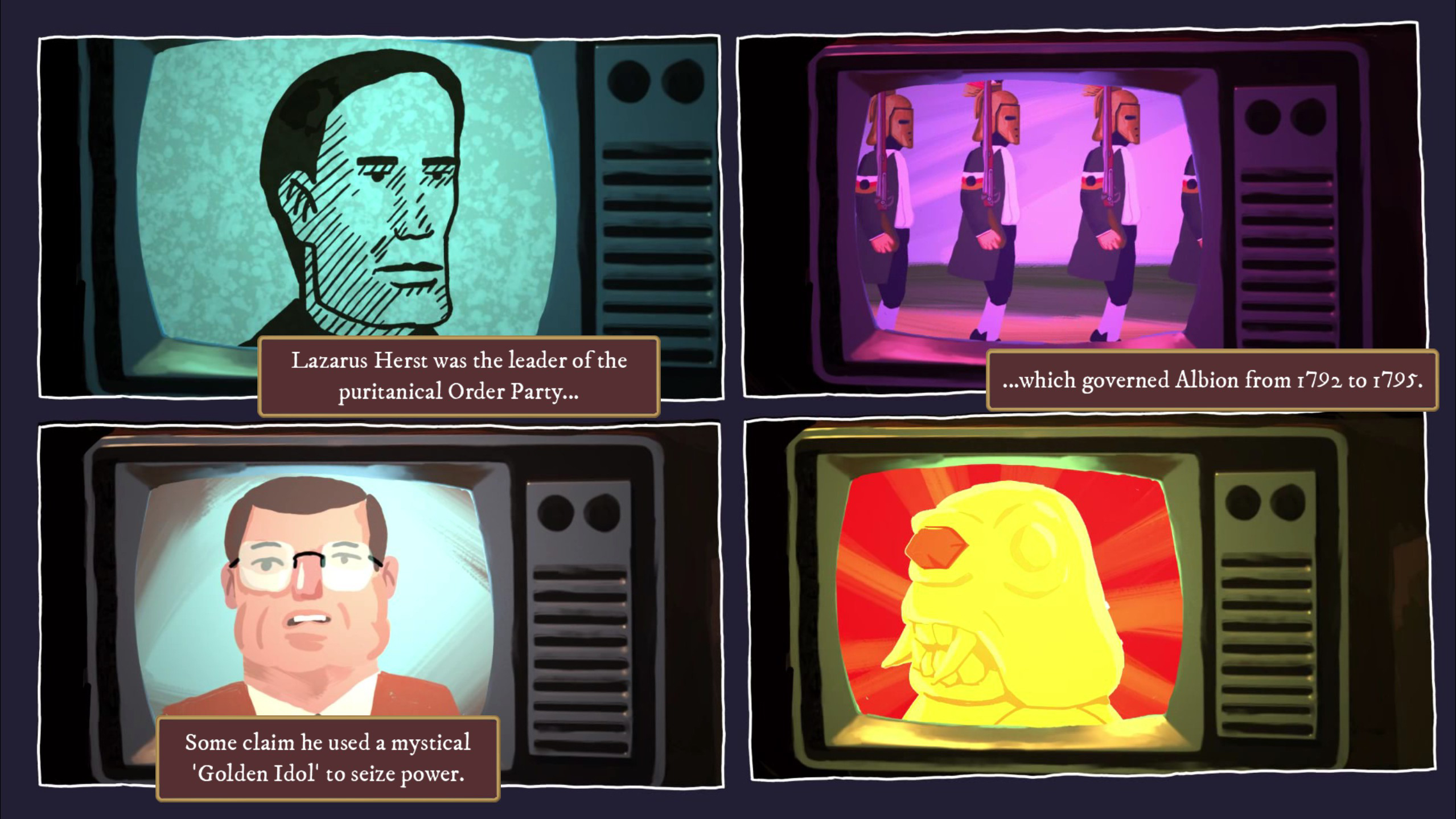
Like the original game, I don't think The Rise of the Golden Idol completely nails the landing. It doesn't give quite enough insight into the motivations of one of its main characters, and at the end of the story I reacted more with "Oh, okay" than "A-ha!" to one of the reveals. Each chapter also ends with a recap puzzle that gets longer and longer—sometimes they can require 30 or 40 words to be plugged in—and that starts to feel sluggish after the excitement of figuring out the scene preceding it.
But those minor beefs don't stop The Rise of the Golden Idol from being an engrossing and satisfying detective game. If you loved the original Golden Idol, you'll love this one almost as much, and if you haven't played the first one, great news: there are now two grisly and gritty detective adventures waiting for you to solve them.







